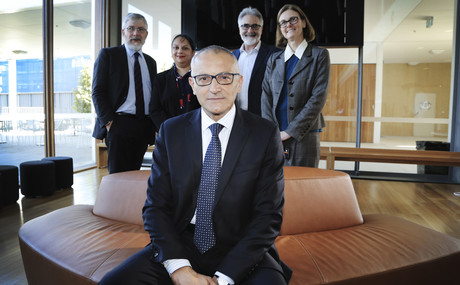Promoting next-gen cancer research

Leaders from the Australian Nuclear Science and Technology Organisation (ANSTO), experts from Italy and clinicians from NSW recently met to explore how the full range of particle therapy treatments may be made available to Australians.
These experts are proposing a National Particle Therapy and Research Centre to provide Australians with access to the very latest in cancer treatments.
“A national particle therapy and research centre would help thousands of Australians now and into the future, by ensuring there is an ongoing research component. ANSTO is thrilled to be part of the continuing discussion of how we can work towards this game-changing national network,” said ANSTO’s Richard Garrett.
“It would deliver not only innovative and potentially life-saving treatments for patients, but cutting-edge research, for example, to understand more about the ways radiation interacts with living tissues,” said Dr Sandro Rossi, the Director General, National Centre of Oncological Hadrontherapy in Italy. Rossi is in Australia this week to share his expertise.
Rossi’s centre is Italy’s national particle therapy centre and is focused on treatment of radio-resistant or inoperable tumours and broader research. “Our facility is one of a small number in the world that is focused on carbon ion particle therapy, providing new treatments to patients with cancer, which is the leading cause of death globally,” said Rossi.
“What we see as the ideal model is a landmark national particle therapy and research centre for both life-changing patient treatment options and research, supported by state-based proton-based particle therapy facilities,” said Garrett.
“We are already making progress on the business case, and will be liaising with the federal and state governments to make this innovative treatment and research approach available to Australians.”
This discussion comes as the federal government announced a $68 million Budget contribution to establish a proton therapy centre in Adelaide — an important first step in Australia to establishing a capability to deliver particle therapies to treat cancers in Australia.
Dr Adi Paterson, CEO of ANSTO, said that discussions such as a Senate Select Committee into low survival rate cancers, and the conversations the researchers had around carbon ion therapy and other types of particle therapy, offer the opportunity to make a significant leap forward for Australian patients with cancer who, right now, have few treatment options.
Proton and carbon edge therapies are being used around the world to improve outcomes for patients with previously untreatable cancers.
“Carbon ion therapy is a game changer — it has the potential to significantly improve patient outcomes and take Australia into the community of nations adopting this advanced approach,” said Dr Paterson.
“It is essentially a process in which a high energy particle beam delivered from a high-tech accelerator can very precisely deliver a dose of radiation targeted to a tumour, matching its shape and size.
“Carbon ions are accelerated to 75% the speed of light and then directed down a beamline with submillimetre accuracy into the tumour, to destroy the cells with near-perfect precision.
“Carbon ion therapy offers the potential to treat disease three times more effectively than conventional radiation therapy, in fewer treatment sessions and with little damage to surrounding healthy tissues.
“Particle therapies like carbon ion therapy could be a silver bullet, improving patient outcomes and their quality of life both during the treatment and after.
Long COVID abnormalities appear to resolve over time
Researchers at UNSW's Kirby Institute have shown that biomarkers in long COVID patients have...
RNA-targeted therapy shows promise for childhood dementia
Scientists have shown that a new RNA-targeted therapy can halt the progression of a specific type...
Parkinson's alters emotion-related bodily sensations
People with Parkinson's disease were found to have significant differences in all bodily...







